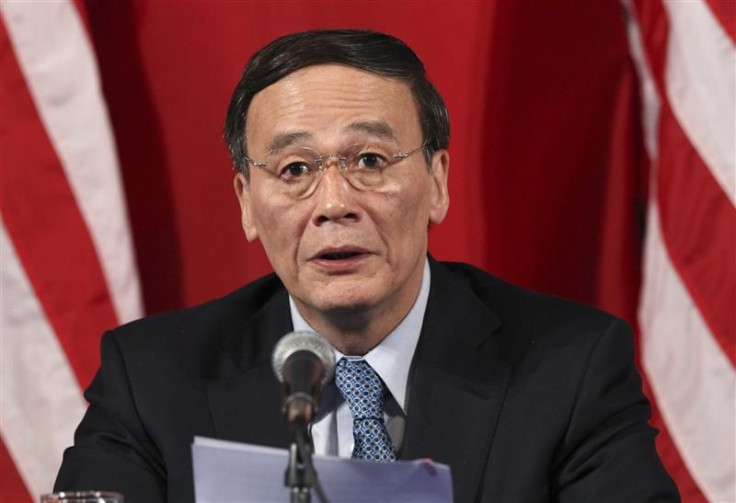Global Economic Outlook Grim, China Tells U.S. Trade Visitors

Chinese Vice-Premier Wang Qishan warned Monday that the global economy remains in a grim state and that an unbalanced recovery might be the best option, at talks where senior U.S. officials warned of a souring mood at home toward China.
The warning, made at the annual U.S.-China Joint Commission on Commerce and Trade, or JCCT, in the southwest Chinese city of Chengdu, echoed Wang's comments over the weekend that a long-term global recession was certain and China must focus on its domestic problems.
Policymakers globally are expressing increasing alarm at the risks facing the world economy, mainly stemming from financial contagion in Europe. Several central banks, including those in the euro zone, Australia, Brazil and Indonesia, have cut official interest rates to support their economies.
Global economic conditions remain grim, and ensuring economic recovery is the overriding priority, said Wang, the top official steering China's financial and trade policy, at the start of the second day of talks.
Wang also said that China and the United States should work together to achieve balanced economic growth.
But his comments also suggested that Beijing should attend to bolstering China's own growth before it worried about global imbalances -- in other words, that a strong Chinese economy that brings a continued trade deficit with the United States would be better for the world economy than a slowdown in China itself.
An unbalanced recovery would be better than a balanced recession, he said.
As major world economies, China and the United States would make a positive contribution to the world through their own steady development, Wang told dozens of trade, investment, energy and agricultural officials from each government seated in a conference hall.
China's growth is slowing - down to 9.1 percent in the third quarter from 9.5 percent in the second-quarter and 9.7 percent in the first quarter, but the rate remains within the government's comfort zone.
The central bank has loosened its grip on bank credit in a bid to support the cash-starved small firms and pledged to fine-tune policy if needed.
TRADE FRICTION ON DISPLAY
The JCCT talks do not address exchange rate policies, but U.S. officials at the talks warned Wang and his colleagues that they could not ignore rising American impatience with China's trade policies and investment barriers.
U.S. souring with China's trade-boosting policies spilled into President Barack Obama's meeting with Chinese Premier Wen Jiabao Saturday in Bali, when Obama raised China's exchange rate policies, which many in Washington say keep the yuan cheap against the dollar in order to help Chinese exports.
At the heart of the trade friction between the two countries is the U.S. trade deficit with China. It swelled in 2010 to a record $273.1 billion from about $226.9 billion in 2009, in spite of both government's pledges to strive to correct global imbalances.
The U.S. Secretary of Commerce John Bryson told the talks that his government welcomed more expanded trade and investment, on balanced terms.
But a reality also is that many in the U.S., including the business community and the Congress are moving toward a more negative view of our trading relationship, and they question whether the JCCT is able to make meaningful progress, said Bryson.
The first day of the two-day talks did not make as much progress...as we need to, said Bryson. It is time to work hard and deliver results, he added.
He and the U.S. Trade Representative Ron Kirk pressed China to make more progress on protecting patents and other intellectual property, opening government procurement purchases to foreign suppliers, and clearing up multinational firms' worries about policies to encourage homegrown innovation.
But Vice Premier Wang had his own salvo of requests: for cutting visa and export red-tape for Chinese businesses; granting China market economy status, so it is less vulnerable to anti-dumping measures; and easing restrictions on Chinese purchases of high-tech goods that Washington deems sensitive.
China is willing to develop even closer and broader economic cooperation with the United States, said Wang.
The outcomes of this session of the JCCT talks will be announced in the afternoon local time.
(Additional reporting by Kevin Yao in BEIJING; Editing by Don Durfee and Chris Lewis)
© Copyright Thomson Reuters {{Year}}. All rights reserved.




















